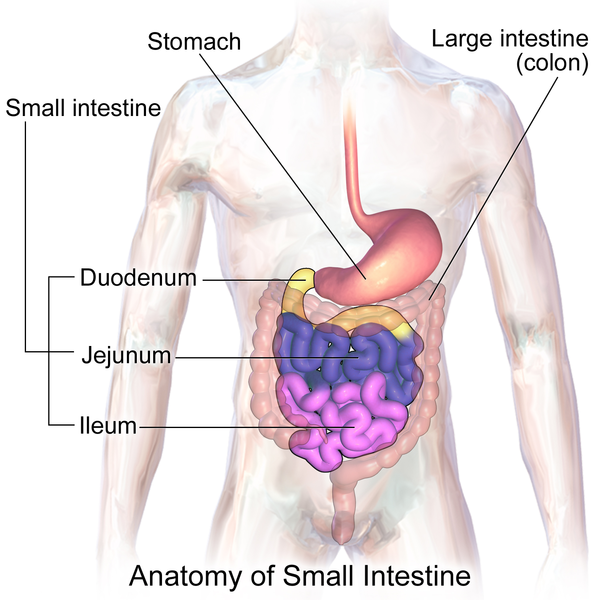
Anatomy
Abdomen
Which of the following best describes the relationship of the duodenum to the pancreas:
Answer:
The first part of the duodenum lies superior to the head of the pancreas. The second part of the duodenum lies immediately lateral to the head of the pancreas. The third part of the duodenum lies inferior to the pancreas. The fourth part of the duodenum does not lie inferior to the head of the pancreas.Small Intestine: Duodenum
Anatomy / Abdomen / Gastrointestinal Tract
Last Updated: 11th April 2019
The small intestine is the longest part of the gastrointestinal tract and extends from the pyloric orifice of the stomach to the ileocaecal fold, comprising the duodenum, jejunum and ileum. The first part of the small intestine is the duodenum.

Small Intestine. (Image by Blausen.com staff (2014). “Medical gallery of Blausen Medical 2014”. WikiJournal of Medicine 1 (2). DOI:10.15347/wjm/2014.010. ISSN 2002-4436. [CC BY 3.0 (https://creativecommons.org/licenses/by/3.0)], from Wikimedia Commons)
Anatomical Position
The duodenum is a C-shaped structure, adjacent to the head of the pancreas, and above the level of the umbilicus. It is retroperitoneal except for its proximal part which is connected to the liver by the hepatoduodenal ligament of the lesser omentum.
Parts of the Duodenum
- The superior (first) part extends from the pyloric orifice of the stomach to the neck of the gallbladder, lies just to the right of the body of vertebra L1, and passes anterior to the inferior vena cava and superior to the head of the pancreas.
- The descending (second) part is just to the right of the midline, extending from the neck of the gallbladder to the lower border of vertebra L3 and lying lateral to the head of the pancreas. This part contains the major duodenal papilla which is the common entrance for the bile and pancreatic ducts.
- The inferior (third) part is the longest section, crossing the inferior vena cava, the aorta and the vertebral column at the level of vertebra L3 and lying inferior to the pancreas.
- The ascending (fourth) part passes upwards on, or to the left of the aorta to approximately the upper border of vertebra L2 and terminates at the duodenojejunal flexure.
![Modified by FRCEM Success. Original by Henry Vandyke Carter [Public domain], via Wikimedia Commons](https://mrcemsuccess.com/wp-content/uploads/2017/02/Pancreas.png)
Relations of the Duodenum. (Image modified by FRCEM Success. Original by Henry Vandyke Carter [Public domain], via Wikimedia Commons)
Blood supply
The arterial supply of the duodenum is primarily from the pancreaticoduodenal arteries, branches of the superior mesenteric artery and the gastroduodenal artery (branch of the common hepatic artery from the coeliac trunk).
Report A Problem
Is there something wrong with this question? Let us know and we’ll fix it as soon as possible.
Loading Form...
- Biochemistry
- Blood Gases
- Haematology
| Biochemistry | Normal Value |
|---|---|
| Sodium | 135 – 145 mmol/l |
| Potassium | 3.0 – 4.5 mmol/l |
| Urea | 2.5 – 7.5 mmol/l |
| Glucose | 3.5 – 5.0 mmol/l |
| Creatinine | 35 – 135 μmol/l |
| Alanine Aminotransferase (ALT) | 5 – 35 U/l |
| Gamma-glutamyl Transferase (GGT) | < 65 U/l |
| Alkaline Phosphatase (ALP) | 30 – 135 U/l |
| Aspartate Aminotransferase (AST) | < 40 U/l |
| Total Protein | 60 – 80 g/l |
| Albumin | 35 – 50 g/l |
| Globulin | 2.4 – 3.5 g/dl |
| Amylase | < 70 U/l |
| Total Bilirubin | 3 – 17 μmol/l |
| Calcium | 2.1 – 2.5 mmol/l |
| Chloride | 95 – 105 mmol/l |
| Phosphate | 0.8 – 1.4 mmol/l |
| Haematology | Normal Value |
|---|---|
| Haemoglobin | 11.5 – 16.6 g/dl |
| White Blood Cells | 4.0 – 11.0 x 109/l |
| Platelets | 150 – 450 x 109/l |
| MCV | 80 – 96 fl |
| MCHC | 32 – 36 g/dl |
| Neutrophils | 2.0 – 7.5 x 109/l |
| Lymphocytes | 1.5 – 4.0 x 109/l |
| Monocytes | 0.3 – 1.0 x 109/l |
| Eosinophils | 0.1 – 0.5 x 109/l |
| Basophils | < 0.2 x 109/l |
| Reticulocytes | < 2% |
| Haematocrit | 0.35 – 0.49 |
| Red Cell Distribution Width | 11 – 15% |
| Blood Gases | Normal Value |
|---|---|
| pH | 7.35 – 7.45 |
| pO2 | 11 – 14 kPa |
| pCO2 | 4.5 – 6.0 kPa |
| Base Excess | -2 – +2 mmol/l |
| Bicarbonate | 24 – 30 mmol/l |
| Lactate | < 2 mmol/l |

